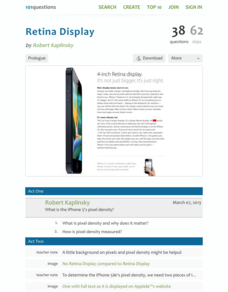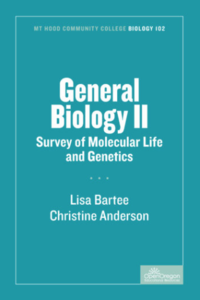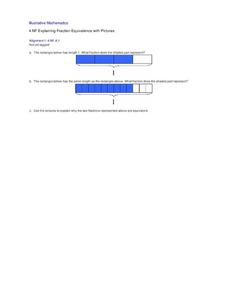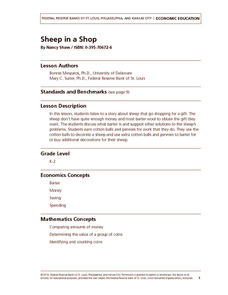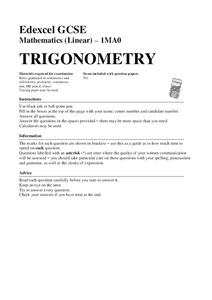Virginia Department of Education
Atomic Structure: Elements
It's all relevant, really. Individuals use the scientific method to learn more about elements, atoms, and their placement on the periodic table. They conduct experiments using materials common in nature to explore how elements affect our...
Houghton Mifflin Harcourt
One Land, Many Trails: Extra Support Lessons (Theme 5)
Grammar, vocabulary, and comprehension strategies are all part of the journey toward understanding a text. The last in a series of three extra support lessons designed to accompany Theme 5: One Land, Many Trails provides a wealth of...
101 Questions
Retina Display
Learners calculate the pixel density of a specific cell phone using the concept of similarity. They use information from the cell phone's website to make their calculations and then compare their results to the posted information.
Reading Through History
Anti-Federalist Paper No. 47
The path to a more perfect union was rockier than most history books would lead you to believe. Young historians read “Antifederalist No. 47,” written by James Madison (under the pen name “Centinel”), which sharply criticizes the...
Biology Junction
Photosynthesis: Energy and Life
All life requires energy ... and the connection between energy and plant life typically requires photosynthesis. Scholars explore photosynthesis in depth from ATP/ADP through the Calvin cycle. A helpful presentation highlights concepts...
Open Oregon Educational Resources
General Biology II: Survey of Molecular Life and Genetics (Mt. Hood Community College Biology 102)
What could be more real life than a biology course? Mt. Hood Community College offers a complete biology textbook with an emphasis on genetics. Topics range from DNA replication to biotechnology and inheritance patterns.
Open Oregon Educational Resources
General Biology I: Survey of Cellular Biology (Mt Hood Community College Biology 101)
From the scientific method to the function of a cell, the eBook has it all. A useful resource provides a free biology textbook with a focus on context. The text begins with an overview of the process of scientific inquiry and biology...
K12 Reader
The Pitch and Volume of Sound
Primary graders are introduced to the concepts of pitch and volume with a reading comprehension worksheet that focuses on the physics of sound.
Illustrative Mathematics
Representing Half of a Circle
Geometric shapes make great visual models for introducing young mathematicians to the concept of fractions. Looking at a series of four circles, students are asked to determine whether or not one half of each circle is shaded. To support...
Illustrative Mathematics
Explaining Fraction Equivalence with Picture
Visual models are a great tool for demonstrating the concept of equivalent fractions. Given two pictures, young mathematicians first identify each fraction and then write an explanation for why they are equivalent. Use as a guided...
Perkins School for the Blind
Conductors of Heat - Hot Spoons
Why is the end of a spoon hot when it's not all the way in the hot water? A great question deserves a great answer, and learners with visual impairments will use their auditory and tactile senses to get that answer. A talking...
Perkins School for the Blind
Conservation of Mass
How do you teach a student with visual impairments about the conservation of mass? You use tactile models that represent the theoretical concept. Baking soda and vinegar are used to add gas to a deflated balloon. Learners will feel the...
Vosonos
Interactive Minds: Solar System
Travel through space as you learn about the galaxy, solar system, planets, and much more. An extensive resource for studying astronomy in upper-elementary and middle school classrooms.
Prince William Network
The Incredible Journey
Divide your school gym into breeding grounds and non-breeding grounds so that your zoologists can play a game simulating the seasonal migration of shorebirds. Players pick one of the included game cards and follow its directions, which...
Federal Reserve Bank
Sheep in a Shop
What do you think sheep might be able to barter when they don't have quite enough to buy a gift? Your pupils can find out this and much more during this activity about Sheep in a Shop, spending, saving, and bartering.
Mathed Up!
Trigonometry
Learn how to solve a triangle. Young mathematicians view a video that explains how to apply trigonometry to find missing sides and angles of a right triangle. A worksheet tests their understanding of the concept.
Mathed Up!
Area of Sector and Length of Arcs
Viewers learn how to apply proportional reasoning to find area of sectors and arc lengths with a video that starts off explaining how to find the areas of circle sectors and the lengths of arcs. Scholars then practice solving problems...
Science Matters
Potential and Kinetic Energy
Everything has potential energy; learning to use it is the key to understanding all types of energy. Scholars learn the difference between kinetic and potential energy. They then apply the concept to drawing examples of both types...
Science Matters
Energy Transfer and Transformation
When you take a simple task and create an exceptionally difficult way to complete it, it is known as a Rube Goldberg machine. These machines are filled with many types of energy transfers and energy transformations. Here, pupils...
Royal Society of Chemistry
A Microscale Acid-Base Titration
Watch as acids and bases put smiles on their faces. Young chemists learn the concept of acid-base titration firsthand in a microscale experiment. Working groups collaborate, titrate, then use their data to determine the concentration of...
Howard Hughes Medical Institute
Zebrafish and Skin Color
You may not know if that zebrafish in your fish tank is a model citizen—but it is definitely a model organism! What can we learn about ourselves from a tiny zebrafish? Discover more about the polygenic trait of skin color through a...
Read Write Think
Book Report Alternative: Rewind the Plot!
Have you ever looked for a new way to teach an old concept? Scholars thinking about the rising action of a story in a whole new perspective. However, Book Report Alternative: Rewind the Plot! challenges readers and allows for much...
Seattle Civil Rights and Labor History Project
Dr. Martin Luther King's Visit to Seattle
How was the work of Dr. Martin Luther King Jr. viewed by others during the 1960s? After watching an oral history video, your class members will learn more about Dr. King's ability to personally connect with others, as well as...
Schools Linking Network & Lifeworlds Learning
How Do We All Live Together?
Explore the concepts of community and point of view with these activities complementing the children's book Voices in the Park by Anthony Browne. Following a class reading of the story, ask students to either draw a map of the...


